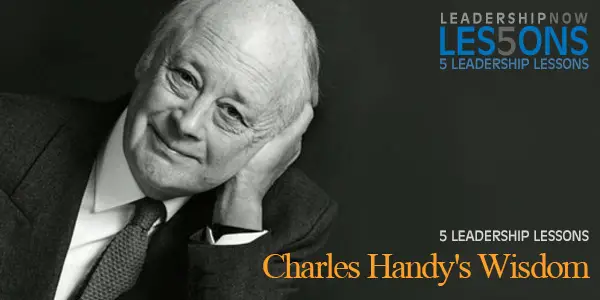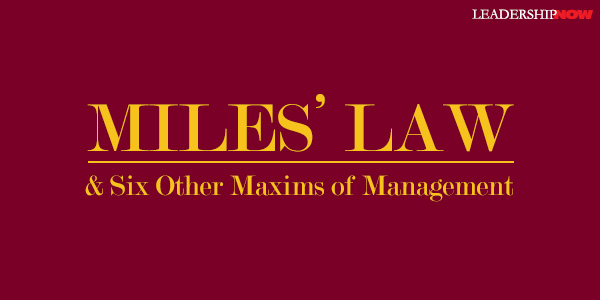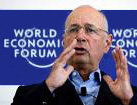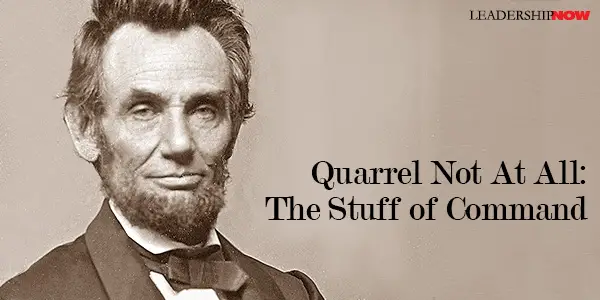 Leading Blog | Posts by Month |
 Leading Blog | Posts by Month |
02.29.08

Aristotle on Virtuous LeadershipJames O’Toole surveys the works of Aristotle in Creating the Good Life, and creates a practical framework that can be used to evaluate leadership in our own time. This excerpt is from a section regarding community leadership:Aristotle says a leader also needs practical wisdom. Practical wisdom has “nothing to do with calculating magnitudes,” nothing to do with science, theory, disciplinary knowledge, or knowledge of facts in any way. It is concerned “neither with eternal and unchangeable truth nor with anything and everything that comes into being (and passes away again). Instead, it deals with matters where doubt and deliberation are possible.” In particular, practical wisdom is not concerned with the way things are but with “how things can be other than they are.” In other words, it is about how conditions in society and organizations could be made better. And “it implies the use of one’s faculty of opinion in judging matters” relating to what is right and wrong for a group, or society as a whole.  Aristotle concludes that virtuous leaders in the Periclean mold are rare, but their scarcity is not due to a shortage of leadership capacity in the human race. Instead, he believes the virtue manifested by those rare leaders is an acquired trait; he believes leaders are made, not born. Indeed they are self-made. At all times, the conscious goal of a just leader is to help followers achieve what is good for them, which, on occasion, may be something different from what they think they want. Hence, in addition to effectiveness, leadership has a moral dimension: the capacity to discern and provide justice.
Posted by Michael McKinney at 08:52 AM
02.28.08

Out of Context: Gaius Petronius Arbiter on Reorganizing"We trained hard, but it seemed that every time we were beginning to form up into teams, we would be reorganized…. I was to learn later in life that we tend to meet any new situation by reorganizing, and a wonderful method it can be for creating the illusion of progress while producing confusion, inefficiency, and demoralization." —Attributed to Gaius Petronius Arbiter (Titus Petronius Niger)
Gaius Petronius Arbiter died in AD 66. He is the reputed author of the Satyricon, a literary portrait of Roman society of the 1st century ad. He was a Roman courtier during the reign of Nero.
Posted by Michael McKinney at 09:10 AM
02.27.08

5 Leadership Lessons: Charles Handy's Wisdom
CHARLES HANDY’S memoir, Myself and Other More Important Matters, is full of candid insights from a thoughtful life. Here are a few lessons to take away:

Posted by Michael McKinney at 07:10 AM
02.25.08

Miles’ Law and Six Other Maxims of Management
Rufus E. Miles, Jr. (1910-1996) was an assistant secretary under Presidents Dwight D. Eisenhower, John F. Kennedy and Lyndon B. Johnson and six H.E.W. secretaries. He developed from “memorable encounters with reality,” Miles’ Law and Six Other Maxims of Management. The law states: Where you stand depends on where you sit. He codified that which we should know intuitively. We see things and form judgments of things from our own perspective. We need to discipline ourselves to see things from other’s vantage point. To his law, he added six maxims: • Maxim 1: The responsibility of every manager exceeds his authority, and if he tries to increase his authority to equal his responsibility, he is likely to diminish both. • Maxim 2: Managers at any level think they can make better decisions than either their superiors or their subordinates; most managers, therefore, seek maximum delegations from their superiors and make minimum delegations to their subordinates. • Maxim 3: Serving more than one master is neither improper nor unusually difficult if the servant can get a prompt resolution when the masters disagree. • Maxim 4: Since managers are usually better talkers than listeners, subordinates need courage and tenacity to make their bosses hear what they do not want to hear. • Maxim 5: Being two-faced—one face for superiors and one for subordinates—is not a vice but a virtue for a program manager if he or she presents his or her two faces open and candidly. • Maxim 6: Dissatisfaction with services tends to rise rapidly when the provider of the services becomes bureaucratically bigger, more remote, and less flexible, even if costs are somewhat lower. These laws were originally published in September 1978. "The Origin and Meaning of Miles' Law," Public Administration Review, September – October 1978. Miles wrote that the “concept is probably as old as Plato, but this particular phraseology arose in the Bureau of the Budget as a result of events that occurred in late 1948 and early 1949.”
Posted by Michael McKinney at 07:22 AM
02.21.08

The Increasingly Political Role of BusinessRecent articles in Foreign Affairs and The McKinsey Quarterly, promote the idea that businesses have a clear responsibility—increasingly a very political one—to the community beyond its shareholders.In Foreign Affairs, Klaus Schwab, the Executive Chair of the World Economic Forum, writes, “Above all, a new imperative for business, best described as "global corporate citizenship," must be recognized.  Schwab writes that state power has shrunk. “At the same time as state power has declined, the influence of corporations on communities, on the lives of citizens, and on the environment has sharply increased. This fundamental shift in the global power equation means that just as communities and citizens look to government for answers and leadership, so now they target corporations with both requests for help and criticism for wrongdoing.” Similarly, in an interview published in The McKinsey Quarterly, with the head of the Council on Foreign Relations, Richard Haass observes that  Both Haass and Schwab see a wider role for the CEO now than in the past. Haass tells MQ, “There is a slightly hermetic quality to management books that doesn’t quite capture an increasingly political, transparent, and demanding reality. Too much of the business literature operates within the confines of the firm, inside the balance sheet, or inside headquarters. That is important and necessary, but insufficient....The new role involves nothing less than a fundamentally different way of doing business. It is about dealing with a wider and more powerful group of stakeholders and constituencies and being proactive, not reactive, with them.” Areas where businesses should assume a stronger social role include the lag between globalization and global arrangements, climate change, how best to integrate a rising China and a rising India into that region and the world, and the Middle East, which contains enough issues to keep anyone occupied. Haass adds, “The uncomfortable reality is that there is no shortage of subjects worth thinking and writing and speaking about if your business happens to be assessing political, economic, and strategic risk and suggesting what to do about it.”
Posted by Michael McKinney at 06:58 AM
02.18.08

Quarrel Not At All: The Stuff of Command IN President Lincoln: The Duty of a Statesman, the follow-up to Lincoln’s Virtues, William Lee Miller, writes that if you knew Lincoln before he became president, you knew that it was part of Lincoln’s character to be capable of overlooking slights to himself, but you might question whether he could, at the same time, “command armies and make the demanding decisions of a nation at war.”
IN President Lincoln: The Duty of a Statesman, the follow-up to Lincoln’s Virtues, William Lee Miller, writes that if you knew Lincoln before he became president, you knew that it was part of Lincoln’s character to be capable of overlooking slights to himself, but you might question whether he could, at the same time, “command armies and make the demanding decisions of a nation at war.”
The stuff of command, especially in a giant deadly conflict, would not seem ordinarily to combine well with the stuff of forbearance and generosity. Executive skill and vigor, like a surgeon’s skill, would appear to require a certain withdrawal of empathy. The resolution necessary to great statesmanship would appear to invite, if not even to require, a certain ruthlessness with those whose wills and complex humanity complicate, impede, and even defy one’s vigorously pursued purpose. In a letter to Captain James M. Cutts who had been found guilty in a court-martial of conduct unbecoming of an officer of a gentleman, Lincoln offered this advice: Quarrel not at all. No man resolved to make the most of himself, can spare time for personal contention. Still less can he afford to take all the consequences, including the vitiating of his temper and the loss of self-control. Miller writes: Interpreting Lincoln, we might say: We overestimate our own interest, and we underestimate our adversary’s, so that the advice to yield on all small matters, and on all matters than even to our distorting eyes seem equally balanced, is a moral corrective. Here is a lawyer, and a politician, and a war leader in the midst of tremendous battles giving this surprising advice: quarrel not at all. Lincoln was a man possessed magnanimity and discriminating judgment, who was able to rise above vindictiveness to win the battles that mattered most. Miller’s book on Lincoln holds many lessons for leaders of today. He shows how Lincoln learned to balance his strengths and weaknesses in a way that made him one of the greatest and most respected leaders in modern times. 
Posted by Michael McKinney at 09:37 AM
02.17.08

Best Presidents In History - 2008 Harris PollHarris Interactive conducted an online poll within the United States last month. They asked over 2000 adults: Which one of the following presidents do you think was the best overall president in our history?The list included all presidents since Franklin Roosevelt, along with some of the more famous from earlier in American history – George Washington, John Adams, Thomas Jefferson, Andrew Jackson, Abraham Lincoln, Theodore Roosevelt, Woodrow Wilson and Calvin Coolidge. Scores were tallied by adding the percentage of those who answered “best” and “second best” for each president. Among modern leaders, Ronald Reagan ranked highest, but even his cache could not compete with the mighty Abe Lincoln, who was named the top president by 20 percent of those surveyed.
Posted by Michael McKinney at 12:02 AM
02.14.08

Out of Context: Managing ParadoxThe more turbulent the times, the more complex the world, the more paradoxes there are. We can and should, reduce the starkness of some of the contradictions, minimize the inconsistencies, understand the puzzles in the paradoxes, but we cannot make them disappear, or solve them completely, or escape from them. Paradox has to be accepted, coped with, and made sense of, in life, in work, in the community, and among nations. We have no chance of managing the paradoxes if we are not prepared to give up something, if we are not willing to bet on the future, and if we cannot find it in ourselves to take a risk with people. These are our pathways through the paradoxes if we have the will. The pursuit of our own short-term advantage, and the desire to win everything we can, will only perpetuate animosities, destroy alliances and partnerships, frustrate progress, and breed lawyers and the enforcement bureaucracy. —Charles Handy, The Age of Paradox
Posted by Michael McKinney at 10:05 AM
02.13.08

How to Start Strong with Any AudienceIn Brian Tracy’s new book, Speak to Win, he presents 8 tips for taking command of the podium before even speaking a word:
Posted by Michael McKinney at 01:11 PM
02.11.08

Insultants Wanted WE need people who will tell us like it is in the right way. Often we don’t like to hear what they have to say but we should never discourage them. Frequently, leaders are the last to know. Keith McFarland author of The Breakthrough Company, calls these straight-shooters insultants (inside consultants). He describes them as those people “willing to ask the tough questions that cause a company to think critically about its fundamental assumptions. The value of insultants is that they will go to great lengths to get their companies to reevaluate a position or adapt to a changing environment.”
WE need people who will tell us like it is in the right way. Often we don’t like to hear what they have to say but we should never discourage them. Frequently, leaders are the last to know. Keith McFarland author of The Breakthrough Company, calls these straight-shooters insultants (inside consultants). He describes them as those people “willing to ask the tough questions that cause a company to think critically about its fundamental assumptions. The value of insultants is that they will go to great lengths to get their companies to reevaluate a position or adapt to a changing environment.”
If you think that you welcome these people, think again. A survey showed that while 90 percent of CEOs believed that their companies regularly implemented ideas that the CEO initially didn’t like, only 60 percent of their direct reports agreed. McFarland reports that people tend to differ to authority and rank because they feel that they must know better. “But often authority figures are wrong, and if an organization doesn’t have a strong insultant culture, errors are likely to be propagated throughout the company.” If you feel you are an insultant, don't think you begin by charging in like a bull in a china shop. There is a right way and a wrong way to do things. You are trying to make the leader successful, not trying to show how smart you are or place the spotlight on yourself. Good insultants must learn to excel at relationships based on genuine care for others. McFarland offers these tips that one would do well to heed:
As a leader, you gain nothing by not knowing what people are thinking. People with ideas and challenges to your way of doing things are not necessarily being insubordinate. They are practicing leadership. Leaders can encourage a candid environment be celebrating productive failure, involving people enough in the issues that they can make intelligent contributions, focusing on both employees and customers that have left the company, and using humor to encourage frankness and trust. 
Posted by Michael McKinney at 01:47 PM
02.08.08

What to Do When Things Go Wrong
WHEN THINGS GO WRONG, we often begin by asking ourselves the wrong questions like “Why is this happening to me?” In QBQ, John Miller writes that “our first reactions are often negative, bringing to mind incorrect questions. But if in each moment of decision we can instead discipline our thoughts to look behind those initial questions and ask better ones (QBQ’s – the Questions Behind the Questions), the questions themselves will lead us to better results….The answers are in the questions.” When a problem (or a challenge is you prefer) arises, we start looking for some control of the situation. The problem is, we quite naturally begin by looking at those around us and ask the wrong types of questions like “why?” and “who?” The wrong questions take away any control of the situation we might otherwise gain. In LeaderShock, Greg Hicks suggests that we look for meaning in the situation first. Ask self-revealing questions like:
He adds, “You’re on shaky ground if you attempt to fix a problem without first understanding what it means to you and your organization. By looking for inherent meaning, you open a rich treasure chest of valuable gems that lead to new information, insight, and opportunities.” John Miller stresses that the right questions contain an “I” and not “you,” “they,” and “them.” “I” questions lead to action. “Questions that contain an “I” turn our focus away from other people and circumstances and put it back on ourselves, where it can do the most good. We can’t change other people. We can’t control circumstances and events. The only things we have any real control over are our own thoughts and actions. Asking questions that focus our efforts and energy on what we can do makes us significantly more effective, not to mention happier and less frustrated.”
Posted by Michael McKinney at 10:28 AM
02.07.08

Out of Context: ExcellenceExcellence, for example, stands for giving our best, on the field of play or in the professional arena. Our motto is “faster, higher, stronger.” Excellence is not just about winning. It is also about a state of mind and a behavior. Making progress against personal goals. Striving to be and do our best in our daily lives. It is about benefiting from the healthy combination of a strong body, mind and will. —Jacques Rogge, President, International Olympic Committee,
Speech in Chicago, November 2, 2007
Posted by Michael McKinney at 11:29 AM
02.06.08

Do You Want to Change the World?
JAMES KOUZES and Barry Posner are the authors of the classic The Leadership Challenge. In A Leader’s Legacy, they make an important point about leadership and passion: When people talk about leadership, they often use the word passion. And when we think about passion we tend to think of emotions like enthusiasm, zeal, energy, exuberance, and intensity. Well, all those attributions might be true, but when you look up the word passion in any dictionary that includes origins you’ll see that it comes from the Latin word for suffering. Passion is suffering! A passionate person is someone who suffers and a compassionate person is someone who suffers with, and shares the suffering of, others—and wants to take action to alleviate this condition. Nearly every act of leadership requires suffering—and often for the leader a choice between one’s personal success and safety and the greater welfare of others. We’re asking you to understand that nothing great comes without costs. 
Posted by Michael McKinney at 01:27 PM
02.04.08

Charles Handy: Are Leaders Born or Made?Charles Handy, in another thought-provoking distillation of his thoughts, Myself and Other More Important Matters, ponders the idea of getting to the bottom of who we really are and the difficulty of seeing ourselves as others see us. Throughout our lives we all play many parts and in a sense, become different people. Can we become something different from what we see ourselves as being to this point? Can we become a leader? Handy weighs in on this:One of the debates in psychology is whether we have a core identity that is sitting there in our inner self, waiting to be revealed, or whether our identity only evolves over time. One of the perennial questions that bug organizations is a derivation of that debate – are leaders born or made? The truth, as in most things, is probably a bit of both. The battery of personality tests that purport to show whether we are introvert or extravert, whether we like structured situations or a bit of chaos, are based on the idea that our real identities are formed by early adulthood and that a good life is about finding situations that fir our characteristics. There is some intuitive truth on this….We can’t escape our genes.Leadership is a possibility we can all explore. It is something we can develop if we choose to. What combination of strengths and weaknesses we have to manage will of course vary from person to person, as we are all different; we are born with different genes. And this is as it should be. Leadership development is a highly personal experience that requires self-knowledge and a willingness to confront those areas where need to improve that will make us effective with people. The traits that will make you a better leader are the same traits that will give you the capacity for success in all areas of your life. Above all, our leadership is reflected in our character. At the same time, leadership training offers the opportunity to examine our thinking in an environment where mentors are available to help us to interpret what we find and guide us to the appropriate changes we need to make in our lives. But no training will, of and by itself, make one a leader. That’s an inside job.
Posted by Michael McKinney at 08:22 AM
02.01.08

Leadership Books: February 2008Here's a look at some of the best leadership books to be released in February.




Posted by Michael McKinney at 08:05 AM
|
BUILD YOUR KNOWLEDGE


How to Do Your Start-Up Right STRAIGHT TALK FOR START-UPS 
Grow Your Leadership Skills NEW AND UPCOMING LEADERSHIP BOOKS 
Leadership Minute BITE-SIZE CONCEPTS YOU CAN CHEW ON 
Classic Leadership Books BOOKS TO READ BEFORE YOU LEAD |
|